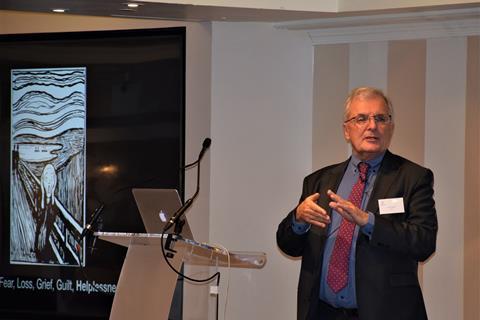Some businesses have greater power to tackle climate change than nation states.

That was the bold statement from Chris Rapley, professor of climate science at UCL, speaking at the first-ever full day sustainability workshop held by the European Public Real Estate Association (EPRA). Europe’s foremost experts in real estate and sustainability gathered last month at the Sofitel London St James hotel to discuss what property can do to tackle this global crisis.
Of course, for businesses to fully embrace sustainability, the agenda needs to be squared with any real estate firm’s ultimate aim: to make money.
So is the sector serious about tackling climate change? And how does this topic affect issues such as workplace design and diversity?
According to the Intergovernmental Panel on Climate Change, buildings accounted for 32% of global energy use and 19% of greenhouse gas emissions in 2010. Yet despite this substantial environmental impact, EPRA representatives said that consideration of how real estate can reduce its carbon footprint is a fairly recent phenomenon.

Rapley argued that property firms had now realised that there is also a strong business case for tackling climate change – not just because advocating green policies helps to create a positive public image, but because there are directly tangible benefits.
For example, he argues that renewable energy is a booming industry that is getting better and cheaper very rapidly. In turn, he predicts that the fossil fuel industry will become unprofitable much more quickly than the likes of Shell and BP think it will.
The business people at the event largely agreed with Rapley’s optimistic forecasts about renewable energy. Simon Cox, sustainability officer at Prologis, and Ben Brakes, head of sustainability at SEGRO, spoke at length about the benefits of making logistics properties less energy-intensive and less reliant on fossil fuels.
There are an enormous number of people who say, ‘We don’t care what Trump says’
Chris Rapley, UCL
“If you’ve got the building right, you can do a lot with a very small amount,” said Cox. As an example, he referred to one Prologis warehouse that has been off-grid for roughly half of 2018 thanks to solar energy panels, three Tesla batteries and some energy-efficient design.
Boosting productivity
During a separate talk, Beth Ambrose, a director of sustainability at JLL; Filip Elland, head of sustainability at Swedish real estate firm Castellum; and Oliver Pye, associate director at sustainability consultant EVORA, contended that a more eco-friendly workplace means more productive staff.
Ambrose referred to a study by Harvard University which showed that reducing carbon dioxide in office air can improve productivity by up to 11%. “The cost is about $40 per person per year, but the increase in productivity ended up being $6,500 per person per year,” she added.

Meanwhile, away from the panels and talks, one attendee explained that his new business model involves providing data to show clients not only what the carbon impact of their real estate is but also how climate change is affecting their portfolio.
For real estate businesses with properties on the coasts of North Carolina, where hurricane season has the potential to destroy huge swathes of buildings, he maintained that the need to address climate change is not up for debate.
However, while many businesses were advocating a more environmentally friendly real estate industry, there wasn’t quite the same clamour from real estate investors. According to a quick show of hands at the second session of the day, investors made up a relatively small percentage of the audience
Another issue raised was that even if it makes business sense for property companies to do something about climate change, the bigger question is why it should be left to them rather than to governments. Rapley’s response is that businesses have more power and influence to affect climate change than some governments.
Because of this, Rapley believes US president Donald Trump’s sceptical stance on climate change has significantly less impact than some people may fear. “There are an enormous number of people in influential positions who get this [climate change] and who say, ‘We don’t care what Trump says. We’re going to reduce our carbon emissions,’” Rapley argued.
This sentiment was echoed by SEGRO’s Brakes. Even with Brexit’s potential to pull the UK out of EU environmental requirements, he is still confident that the logistics sector will continue to push for more efficient buildings. “Regardless of Brexit, we will continue as planned,” he affirmed.
However, the disadvantage of businesses taking independent control of their sustainability agendas is that it is difficult to regulate what is being done. Any business can claim it is being sustainable, but holding that business to account over those claims is not always simple.

The Science Based Targets initiative attempts to solve this conundrum. Supported by UN, the organisation creates measurable targets for businesses based on the steps they need to take to meet a target for helping to cap rising temperatures at 1.5°C or 2°C.
Prologis’ Cox confirmed that his company was adhering to the Science Based Targets initiative, a policy that it had introduced this year. “I see that as a big step for a big American corporation,” he said.
Although the Science Based Targets system has its upsides, attendees pointed out some downsides. To begin with, like so many other climate change targets, it is optional rather than mandatory for businesses. Another difficulty is the way in which some companies throw around the term ‘science-based targets’ to make it sound as if they are meeting the Science Based Targets initiative.
Uncertain targets
According to another attendee, a third problem is that there is an assumption that businesses are meeting the 1.5°C climate change target when they announce they are following the Science Based Targets initiative, but they are more likely to be meeting the higher 2°C climate change target.
During the penultimate panel of the day, the value of sustainability ratings and the issues surrounding target-making and self-regulation became apparent. One audience member raised the point that private real estate sustainability ratings companies have a vested interest in advertising their systems as the most accurate and worth the most money.
The audience member asked panellist Jasmine Mehta, sustainability issuer at stock market analyst MSCI, to confirm whether the data used to create MSCI’s sustainability rating system will be made publicly available so that it could be independently assessed. Mehta declined to comment.

Peter van den Tol, fund manager at Dutch investor MN, criticised the flexibility of many existing rating systems, worrying that some businesses might be able to game the system to get the rating they want. He added his view that these systems need to be stricter if they are to have value from an investor’s perspective.
However, during the event’s closing remarks, Louise Ellison, group head of sustainability at Hammerson, argued the debate and scepticism surrounding real estate sustainability rating systems was healthy. It is a sign that the industry’s attitude towards climate change is maturing and that it wants to do better, she maintained.
I think this is converging into something more important for society and investors
Sandra Dowling, PwC
The final panel of the day was on diversity, which one attendee observed is often thrown together with sustainability as an issue.
However, the all-female panel believed there was good reason for this. “We are now starting to measure these things,” said Lucy Phillips, managing director of strategic communications at FTI Consulting.
“I think ideas about making a positive social impact are all converging now into something that is much more important for society and investors,” added Sandra Dowling, real estate leader at PwC. “A long-term business model has to have all of this in it,” she said.
The panel’s moderator, Sam Monger, director of strategy and research at Grosvenor, observed that the messages behind tackling diversity and tackling sustainability are often the same.
Running out of time
Indeed, throughout the panel on diversity, there were comments that could also apply to climate change. “The challenge is that it takes time, and we’re running out,” noted Dowling. “It’s a long journey, but we need to be part of it,” said Una O’Reilly, human resources director at Unibail-Rodamco-Westfield.
Though the rhetoric at the event was strong, the real test will be the extent to which businesses and investors take action. Fong Yee Chan, senior product manager of sustainable investment at FTSE Russell, was at the event and is attempting to do just that.
This week, a new FTSE Russell index, which ranks real estate according to its sustainability, was launched. This index does not force big real estate investors to do anything, but the hope is that it will push the sustainability agenda to the forefront of investors’ minds.
Speaking from an investor perspective, van den Tol agreed with making sustainability a more visible topic, believing that it needs to be reported alongside profitability rather than separately.
In his keynote speech, Rapley insisted on a hopeful outlook. He expressed confidence that investors and businesses are no longer simply waxing lyrical when they declare that they want to make real estate more sustainable. It was a sentiment many in the audience seemed to agree with. Future generations will decide whether everyone was right to be so confident.






























No comments yet